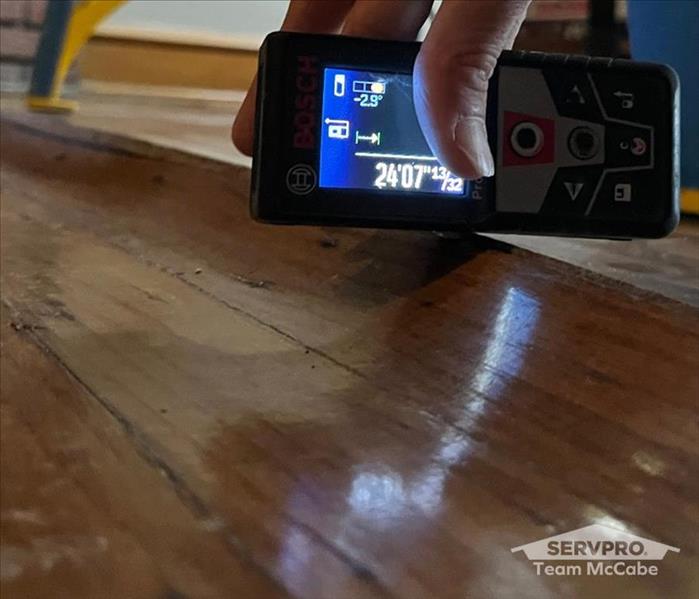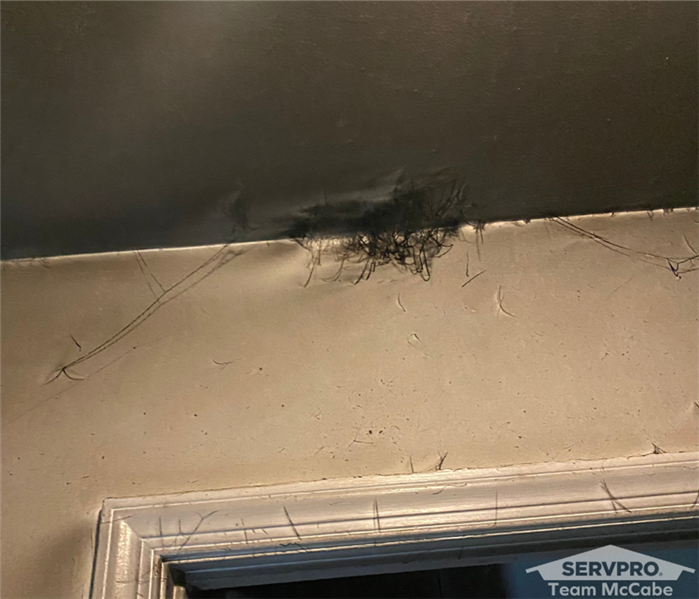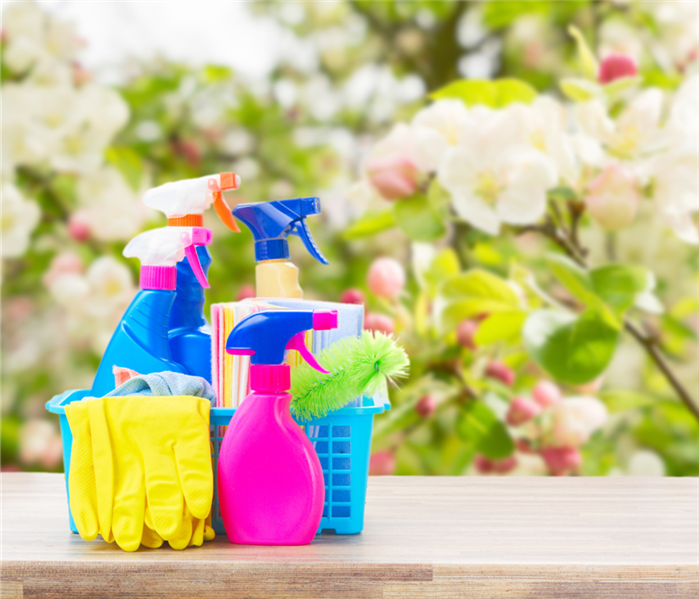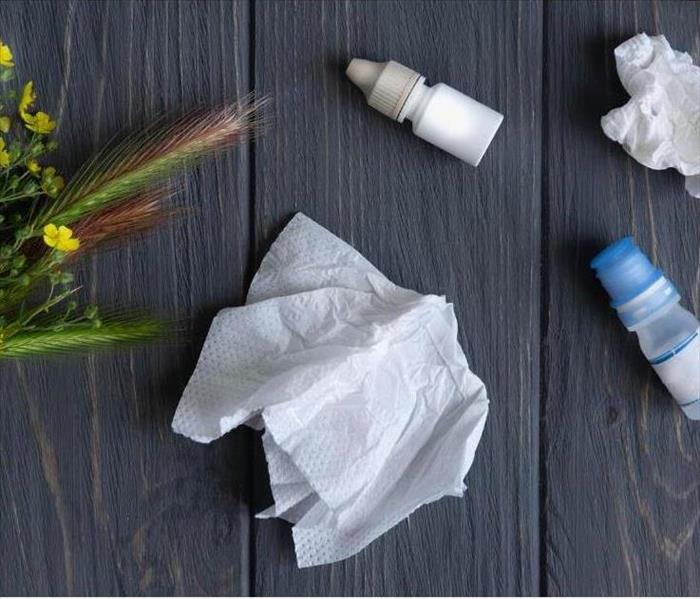Recent Posts
SERVPRO Can Remediate Water Damage on Any Type of Flooring in Your Home
11/5/2024 (Permalink)
 Cupping floors? It could be a sign of water damage. SERVPRO Team McCabe uses moisture meters to detect elevated moisture levels.
Cupping floors? It could be a sign of water damage. SERVPRO Team McCabe uses moisture meters to detect elevated moisture levels.
Water damage to laminate flooring is a common issue, often caused by plumbing leaks, floods, spills, or improper maintenance. Any source of water on laminate floors can result in damage, and coverage varies—some manufacturer warranties and homeowner insurance policies may cover it, though often water damage isn’t covered at all. Depending on the extent of the damage, repairs may involve anything from individual plank replacement to complete floor replacement, which a professional water damage company like SERVPRO can assess and handle effectively.
Appliance and Plumbing Leaks
Leaks from appliances like water heaters, dishwashers, ice makers, and washing machines can cause laminate flooring to buckle. Many leaks are slow and hard to detect, as they often occur underneath the laminate, penetrating its core. While you might not immediately notice such leaks, a SERVPRO technician can use specialized moisture meters to identify hidden moisture and prevent further damage.
Water Damage from Concrete Floors
Water can also enter laminate flooring from below, especially from concrete subfloors that are too damp, leading to a “cupping” effect across the floor. This can happen even with a vapor barrier in place. To prevent this, every concrete floor should be tested for moisture before installing laminate. Freshly poured concrete should cure for at least 60 days before laminate is installed. SERVPRO’s trained technicians use advanced testing methods, like electronic moisture detection, to ensure a dry and stable surface.
Preventing Water and Pet Damage Through Maintenance
Improper wet cleaning or frequent spills can lead to joint swelling along the edges of laminate planks. Wet mopping, especially with popular tools like the Swiffer Wet Jet, may cause these issues over time. Additionally, pet urine and spills often create localized swellings between planks. It’s important to note that most laminate manufacturers do not cover water damage related to maintenance or spills under warranty.
If you suspect or know you have water damage on your laminate flooring, SERVPRO of Columbia, Montour & Sullivan Counties can help. Call us anytime at 570-759-0966. Our team will test for water damage, assess the extent, and work to restore your home quickly and professionally.
Winter Fireplace Safety Tips from SERVPRO
11/5/2024 (Permalink)
 These aren’t your everyday cobwebs – they’re soot webs left behind after a fire. Got a job that’s more than dust and cobwebs? We’re here to help!
These aren’t your everyday cobwebs – they’re soot webs left behind after a fire. Got a job that’s more than dust and cobwebs? We’re here to help!
As winter approaches, gathering around the fireplace becomes a cherished way to stay warm and enjoy time with loved ones. To ensure the safety of you and your family, follow these essential steps before lighting a fire this season.
Have Your Fireplace Professionally Cleaned
According to the National Fire Protection Association, chimneys should be swept at least once a year by a professional cleaning service. This cleaning removes dangerous creosote buildup, preventing potential chimney fires and improving overall air quality.
Always Cap Your Chimney
A chimney cap prevents rain, debris, and even animals from entering your fireplace, reducing risks of blockages that can lead to smoke backup or puffbacks. Puffbacks—backfires caused by trapped fumes—can send soot and smoke into your home, so this preventive measure is essential.
Burn Seasoned Wood Only
Only use seasoned wood for a safer, cleaner burn. Unseasoned wood generates more smoke, leading to greater soot buildup and creating a risk of soot cobwebs, which form when soot particles collect on ceilings and corners near the fireplace. For guidance on wood selection, visit the Chimney Safety Institute of America website.
Use a Small Amount of Wood
Burning a smaller amount of wood creates less smoke, which is healthier for your family and reduces buildup in the chimney. Less smoke also helps prevent soot cobwebs from forming around your fireplace.
Place Wood on a Metal Grate
Setting logs on a metal grate allows air to circulate around them, improving combustion and minimizing smoke output.
Use a Fireplace Guard
Install a guard on both sides of the fireplace to prevent sparks from escaping, which protects both people and nearby appliances from potential harm.
Extinguish the Fire Safely
After the fire dies down, bury the remaining embers under ashes and pour sand over them to ensure the fire is fully out. This minimizes the risk of stray embers causing accidental flames.
Types of Chimney Fires
Free-Burning Fires: Characterized by loud, intense flames and visible smoke exiting from the chimney top.
Slow-Burning Fires: These fires burn at high temperatures but are much quieter than free-burning fires, making them easy to overlook. Despite being less noticeable, slow-burning fires are extremely hazardous.
SERVPRO is Here to Help
At SERVPRO of Columbia, Montour & Sullivan Counties, your safety is our top priority. If your home experiences smoke, soot cobwebs, or puffbacks, our team has the expertise to clean and restore affected areas. We hope you enjoy the warmth and comfort of your fireplace this winter, knowing SERVPRO is ready to help if the unexpected occurs. For professional cleanup or restoration services, call us at 570-759-0966.
Don’t Forget to Spring-Clean Your Business
4/30/2024 (Permalink)
 Spruce up your business for spring!
Spruce up your business for spring!
When most people think of spring cleaning their minds go right to their own homes but businesses deserve an annual freshening up too! Spring cleaning doesn’t just apply to houses anymore, business owners can take advantage of this time of year to get organized and deep clean their home away from home. Customer-facing areas need more cleaning attention than you think. Behind-the-scene areas may seem fine but need regular cleaning and maintenance too. Consider the following tasks to elevate your spring cleaning routine:
Rearrange the furniture:
Transform your space effortlessly by reorganizing furniture. Consider removing bulky pieces to create more room and experiment with different layouts until you find the perfect setup. Utilize natural light by strategically placing mirrors or reflective decor to enhance brightness. If your space is an office or cubicle try moving your monitors around to give your space a fresh look.
Get a Duct Cleaning:
Air ducts need routine maintenance. Commercial air duct cleaning should be added to your spring cleaning list. Clean air ducts will safeguard indoor air quality and mitigate the risk of mold and allergen exposure. Regularly maintained air ducts will help to extend your HVAC lifespan, yielding long-term cost savings.
Get Your Carpets Professionally Cleaned:
Vacuuming your carpets will give them a clean look but if you want the deep dirt and grim gone you’ll need a professional. SERVPRO® of Upper Bucks, NW Hunterdon County has cutting-edge cleaning machinery and effective products that will give your carpets and rugs the deep clean they need.
Disinfect the Kitchen:
A company’s kitchen is a space that is often used frequently but rarely cleaned. Take the time to scrub the sink and clean the drain. Pouring one cup of baking soda followed by 1 cup of vinegar into the drain is an easy way to clean a drain. After 30 minutes don’t forget to pour plenty of boiling water down the drain to flush the mixture out. The fridge is another part of the kitchen that can quickly become out of hand. Address refrigerator clutter by removing all items and facilitating a coworker claim process, disposing of unclaimed items promptly. Clearing all of the food out of the fridge and freezer also allows for wiping down the surfaces. A simple hot soapy water concoction should do the trick!
Power Washing:
Enhance curb appeal and impress potential clientele by rejuvenating outdoor spaces with power washing. Consider renting a pressure washer to give your outdoor stained areas a makeover. A 1,000 square foot area can take anywhere from 1-3 hours to pressure wash so if you don’t have that kind of time on your hands remember you can always call in a professional!
Individual Tidying:
This is without a doubt the simplest task on this list but it can make the biggest difference in achieving a clean look. Encourage your team to go through and declutter everything on or in their desks. Consider making a communal pile for documents that need to be shredded. If you’re feeling ambitious and want to do a deep cleanout you can utilize SERVPRO of Upper Bucks, NW Hunterdon County dumpster rental service.
These suggestions are just the beginning— embrace the opportunity to elevate your workspace, cultivating a tidy and inviting environment that nurtures success.
Allergy Proof Your Home
3/27/2024 (Permalink)
 Are allergies making your life miserable?
Are allergies making your life miserable?
As the seasons change, so do the challenges homeowners face. One of the most prevalent issues during spring and summer is the onslaught of pollen and seasonal allergies. While many people focus on protecting themselves from outdoor allergens, it's equally important to safeguard your home against these invaders. At SERVPRO®, we understand the importance of maintaining a healthy indoor environment. Here are some steps you can take to defend your home against seasonal allergies
Understanding Seasonal Allergies:
Seasonal allergies, often triggered by pollen from trees, grasses, and weeds, can wreak havoc on your health and quality of life. Symptoms such as sneezing, congestion, itchy eyes, and fatigue can make it difficult to enjoy the beauty of spring and summer. However, by implementing preventive measures, you can create a sanctuary within your home where you can breathe easy.
Sealing Your Home:
One of the first lines of defense against pollen infiltration is to seal your home effectively. Inspect doors and windows for any gaps or cracks that may allow pollen to enter. Replace worn weather stripping and apply caulking where necessary to create a tight seal. Additionally, consider installing pollen-resistant screens on windows to filter out airborne allergens while still allowing fresh air to circulate.
Maintaining Cleanliness:
Regular cleaning is essential for keeping allergens at bay. Dust and vacuum your home frequently, paying special attention to areas where pollen may accumulate, such as carpets, rugs, and upholstery. Use a vacuum cleaner equipped with a HEPA filter to trap even the smallest particles. Wash bedding, curtains, and other fabrics regularly in hot water to remove pollen and other allergens. At SERVPRO of Upper Bucks, our professional cleaning services can provide a thorough and efficient solution to ensure your home remains free of allergens.
Filtering Indoor Air:
Investing in a high-quality air purifier can significantly improve indoor air quality by capturing pollen, dust, and other airborne particles. Choose an air purifier with a HEPA filter and consider placing it in frequently used rooms for maximum effectiveness. Additionally, regularly replace the filters in your HVAC system to prevent pollen from circulating throughout your home.
Professional Restoration Services:
In addition to these preventive measures, sometimes unforeseen circumstances such as water damage or mold growth can exacerbate indoor allergen issues. That's where SERVPRO comes in. Our team of trained professionals specializes in water damage restoration, mold remediation, and indoor air quality improvement. Whether you're dealing with a flooded basement or a persistent mold problem, we have the expertise and resources to restore your home to its pre-damage condition quickly and efficiently.
As allergy season approaches, taking proactive steps to safeguard your home against pollen and other allergens is essential for maintaining a healthy indoor environment. By sealing your home, maintaining cleanliness, filtering indoor air, and utilizing professional restoration services when needed, you can create a haven where you can breathe easy and enjoy the beauty of spring and summer. At SERVPRO of Upper Bucks, we're here to support you every step of the way on your journey to a healthier home.
6 Ways to Love Your Home
2/20/2024 (Permalink)
 People aren't the only ones who deserve love!
People aren't the only ones who deserve love!
People aren’t the only ones who deserve love this time of year. Why not shower some love on the place you spend so much of your time? Neglecting home maintenance can increase your chance of costly fire, water, or mold damage. Here are 6 ways to be kind to your home and in return your bank account as well!
1. Empty dryer vents- Lint accumulation in dryer vents decreases machine efficiency and most importantly poses a major fire hazard. If you’re seeking professional services in this area don’t forget SERVPRO® Team of Columbia, Montour, and Sullivan Counties offers air duct and HVAC cleanings.
2. Inspect Sump Pump- Your sump pump is what stops built-up rainwater and heavy rain from ruining your basement by moving it away from the foundation of your house. There are many different methods you can use to test your sump pump, we suggest checking both the pump’s power and functionality by slowly pouring a 5-gallon bucket of water into the sump pump pit and looking to see if the float of the pup is rising and then once the water is pumped watch and listen to see if the pump has successfully turned itself off.
3. Clean Gutters- Clogged gutters and downspouts can lead to water damage and other serious structural problems. It’s recommended to clean your gutters at least twice per year to maintain proper drainage and prevent potential damage
4. Protect Pipes- Maintaining a thermostat setting of 65º or above helps prevent pipes from freezing. Insulating exposed pipes located in unheated areas like your attic, crawl space, or garage can further safeguard against cold temperatures and potential bursts.
5. Enhance Airflow- It’s safe to presume that where air isn’t flowing, mold is growing! Open doors between rooms, and leave closet doors open to increase air circulation.
6. Test Smoke Alarms- This is a simple task to check off yet it’s rarely done enough. Press and hold the test button on the smoke detector. If the sound is not ear-piercingly loud, it’s time to change the batteries. Smoke alarms should be tested every month and remember most alarms have a life span of 8-10 years so be sure to check the date of manufacture inside to determine if it’s time to replace the entire unit.
By staying proactive and having a reliable partner like SERVPRO just a call away, you can rest assured knowing you’re giving your home the love it deserves!
 Cupping floors? It could be a sign of water damage. SERVPRO Team McCabe uses moisture meters to detect elevated moisture levels.
Cupping floors? It could be a sign of water damage. SERVPRO Team McCabe uses moisture meters to detect elevated moisture levels.




 24/7 Emergency Service
24/7 Emergency Service



